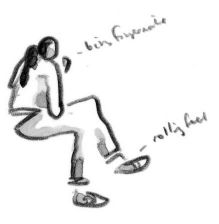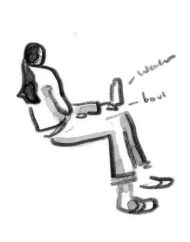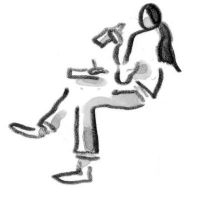Ridiculous/Hilarious/Terrible/Cool (2 page)
Read Ridiculous/Hilarious/Terrible/Cool Online
Authors: Elisha Cooper

BOOK: Ridiculous/Hilarious/Terrible/Cool
10.35Mb size Format: txt, pdf, ePub
Emily's eyes are intense and brown, her skin the color of cocoa. Her curly black hair is pulled tight in a ponytail that hangs over strong shoulders, which today are sporting a yellow T-shirt that reads
brasil
. Emily is captain of the Payton girls' soccer team.
brasil
. Emily is captain of the Payton girls' soccer team.
Emily has goals for her team. As a junior, when she was also captain, Emily led the Grizzlies to the regional finals in States. This year the Grizzlies will move to a larger division and play the best high schools in Illinois. Emily's goal is to lead her team to the finals. She welcomes the challenge, welcomes the responsibility. She will coordinate conditioning, organize indoor games in the winter, everything leading to a successful spring season.
Emily has her own goals too. She's been All-City, All-Conference, All-Section, almost every year since she was a freshman. She's won team awards for leadership, for being a scholar athlete. She's been the team MVP. She's scored countless goals and had even more assists. She plans to match these successes and top them this year. And then, of course, there's college.




“Hey!”
shouts a friend, and Emily's serious face breaks into a big toothy grin, wide and infectious, as if she just ripped a ball into the back of the net and were acknowledging the cheering crowd.
shouts a friend, and Emily's serious face breaks into a big toothy grin, wide and infectious, as if she just ripped a ball into the back of the net and were acknowledging the cheering crowd.
After talking with her friend, back goes the serious face. Emily stops at her locker before swinging herself down the hall again, right shoulder, left shoulder, right. Then she sees another friend and cocks her foot and kicks her in the rear end.
At 9:04, the bell rings for class, and a river of students streams through school as if the gates on a dam were opened. The students splash down stairs, gurgle up stairs, rush from class to class, and flood the atrium.
Payton centers around its atrium, an airy three-story-high space in the middle of the school. Everything opens on the atrium: the library, the gym, the recital hall, the cafeteria, the classrooms, the administration offices, the hallways. Wide windows grace each end of the atrium. In its middle are two stairways: one up, one down.
Security guards hover at the stairs. In their orange and blue Payton sweatshirts, they look like the students, though twenty years older and fifty pounds heavier. As they swipe at baseball hats and growl at anyone trying to go up the down staircase, they look like bears in a waterfall swatting at salmon.
Then at 9:08 the bell rings again. And, as if the gates on the dam were closed, the last drops of students race up and down the stairs, books clutched to their chests, late for class. The guards shout: “Let's go. Let's
go
. Where we supposed to
be
?!”
go
. Where we supposed to
be
?!”
Maya Boudreau sits in her AP English class on the third floor, fidgeting. She has a fidgeting routine. It starts with her right foot, rolled clockwise. Then her left foot, rolled counterclockwise. Then she sucks her cheeks in, pouts her full lips, smoothes her hands, and starts rolling her foot again. Sometimes, to vary the routine, Maya chews her hair.
Maya has long brown hair and pretty Midwestern features. She looks like the proverbial girl next door, if next door were the twenty-sixth floor of the downtown apartment building along Lake Shore Drive where Maya lives with her family. But Maya does have a small-town affect. The big wide eyes, the careful note-taking. She could play the role of The Good Student.
Maya has performed in countless productions at Payton and has the reputation as
the
actor in school. She's acted in a youth program at Steppenwolf Theatre, taught acting over the summer at the Lookingglass Theatre. When she daydreams in class, which is often, she pictures herself in New York, acting on the stage and living a romantic life. Sometimes, of course, she just daydreams about boys.


the
actor in school. She's acted in a youth program at Steppenwolf Theatre, taught acting over the summer at the Lookingglass Theatre. When she daydreams in class, which is often, she pictures herself in New York, acting on the stage and living a romantic life. Sometimes, of course, she just daydreams about boys.


Even with Maya's fidgeting, the other kids in class are fidgeting more. It's as if the entire class has Tourette's. The shaggy-haired boy to Maya's right tugs on his soul patch so hard it looks painful. The shaggy-haired boy to Maya's left drums on the part of his hairy belly that's peeking out from his shirt. Across from Maya, a skinny boy with big ears flips a pencil. The girl next to him bites her fingernails until they bleed. The boy next to her picks his nose, and when no one is looking, wipes what he got out on his socks.
The only one in the classroom not fidgeting is their English teacher, Ms. Murphy. Though, her hair sort of fidgets. Red and frizzy, it bounces above her with a mind of its own, spiraling toward the ceiling and toward the theater-poster -covered walls, as the person beneath it circles the room and makes her introductions for the year.


Maya watches and rolls her foot, daydreaming about New York.
On the front of each Payton ID is the student's photo, her class and lunch period, everything laminated and fastened to an orange and blue lanyard. Some students wear their lanyard backward, some hang their lanyard in their pants pocket, some substitute their own lanyards. Not Diana Martinez. She wears hers correctly, her ID around her neck. Diana's ID has her photo: round face, dark eyes, thick hair. Her class: senior. Her lunch period: fifth. Her ID does not show her roundish body or plain clothes. As she sits quietly in her classes, she does not invite attention.
When teachers ask questions, Diana answers in her head. Sometimes she feels intimidated by the smart students in class, the ones who answer everything. As they talk, she watches. She often finds that the smart kids say, word for word, what she was thinking, but she still rarely raises her hand to speak.
When Diana does speak outside of class, she does so carefully in the not-quite-accurate speech of someone for whom the language does not come easily, something she seems aware of and makes allowances for. Instead of “Yeah,” she says “Yes,” with each of the three letters carefully enunciated:
“Ye-eh-es.”
She always talks with a small smile on her face.
“Ye-eh-es.”
She always talks with a small smile on her face.
Diana speaks Spanish at home with her parents, English with her siblings. Her father drives the night-shift forklift for a trucking company. Her mother runs the house and takes care of Diana's younger brother. Diana's twin sisters are one year older
 than she is, and just graduated from a high school in their West Side neighborhood that is entirely Mexican. They tease Diana for going to a “white” school. They think Diana is “book smart, street stupid,” and think they themselves are “book stupid, street smart.” Neither sister works. Diana has an older brother and he doesn't work either.
than she is, and just graduated from a high school in their West Side neighborhood that is entirely Mexican. They tease Diana for going to a “white” school. They think Diana is “book smart, street stupid,” and think they themselves are “book stupid, street smart.” Neither sister works. Diana has an older brother and he doesn't work either.

Diana thinks her sisters are being unfair. Nothing is that simple. Diana doesn't feel so stupid about life, or so smart about books. It's not as if schoolwork comes without difficulty.
She wants to go to college. She also wants to hang out with her friends. She wants to be a good daughter. She also wants alone time. Sometimes Diana feels pulled between her livesâ the one she has in high school and the many others outside it. Everyone wants a part of her. Everyone wants her to do something, be something, be somebody. It takes a lot of effort to navigate between all these pressures.
Over the summer Diana was a lifeguard for the Chicago Park Service. Now she swims on the Payton swim team. She's not the fastest swimmer, but being in the pool is one of the few times she has to herself. As she walks through the hallway to her next class, she says, “You can actually think when you're in the water.”
The halls are filled with hugging! In the first week of school, the constant hallway sounds of clanging lockers and squeaking sneakers are punctuated by little explosions: a shriek of recognition, two students throwing their arms wide from a distance of fifteen feet, a quickening shuffle, hug!

Other books
Mercury in Retrograde by Paula Froelich
The Closer by Donn Cortez
Islam and Terrorism by Mark A Gabriel
Temple of a Thousand Faces by John Shors
Dewey Defeats Truman by Thomas Mallon
La séptima mujer by Frederique Molay
Bleeder by Smoak, Shelby
Murder at the Art & Craft Fair by Steve Demaree
Buy a Cowboy by Cleo Kelly
Magic in Our Hearts by Jeanne Mccann